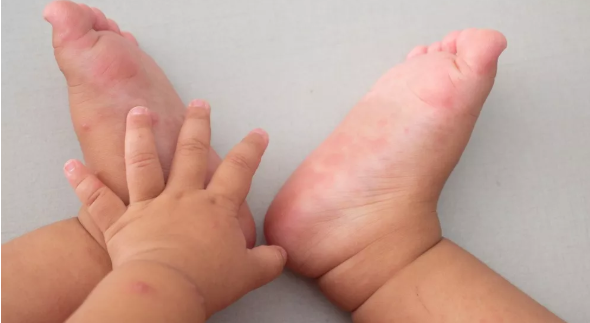
Recently, autumn is brisk and suitable for taking your baby out to play.
However, when seasons change, children are also more likely to get sick. At the same time, the baby’s immune function is not yet mature, and I don’t know if he is ready to resist various diseases.
Only by knowing the common infectious diseases in autumn in advance can we better prevent and deal with them.
Hand, foot and mouth
Hand-foot-mouth disease, with its peak onset from April to July, may also occur in autumn. Generally, babies under 5 years old are more vulnerable to infection.
Common prominent symptoms are maculopapules and herpes on the baby’s hands, feet and buttocks, and even herpes or ulcers in the oral cavity. Then there will be fever, fatigue and pain all over the body. According to the severity of the baby’s symptoms, the manifestations are different.

Hand-foot-mouth disease is mainly caused by enterovirus. The most common pathogens are Coxsackie virus group A type 16 and enterovirus type 71, which are mainly transmitted through air, diet and close contact.
How to deal with hand-foot-mouth disease?
Hand-foot-mouth disease is a viral infectious disease. At present, there is no specific medicine for what. The main purpose of treatment is to relieve the discomfort of children. Severe cases require hospitalization.
Fever caused by hand-foot-mouth disease usually lasts for 2-3 days. If the child feels uncomfortable or his body temperature is higher than 38.5 ℃, he can take antipyretic drugs orally.
Encourage children to eat some soft, light and digestible food, and can give some soft and rotten liquid or semi-liquid food according to their age, such as noodle soup, porridge, rice paste, breast milk, etc. In addition, cold food will make children more comfortable.
Autumn diarrhea
In autumn, it is also the season when rotavirus, which induces autumn diarrhea, is more arrogant. Autumn diarrhea is mainly transmitted through feces-mouth.
Babies who have diarrhea in autumn often have a large amount of stool: more water, more times, up to 5 ~ 10 times a day, and yellow poop. In addition to diarrhea, the baby may also have fever and vomiting.

Suffering from autumn diarrhea, the emphasis is on symptomatic care.
The whole symptom can last for 5 ~ 7 days. Remember to prevent baby dehydration and secondary lactose intolerance.
Diarrhea frequency is more, need a small amount of oral third generation rehydration salt to replenish water and electrolyte for many times. To pay attention to whether children will appear obvious dehydration characteristics in time, such as obvious reduction of urine, dry lips, no tears when crying, fontanelle depression, poor spirit, etc., seek help in time.
For less severe diarrhea, babies who are exclusively breastfed can continue breastfeeding to maintain water in their bodies. If the doctor deems it necessary, they can take some oral rehydration salts. For children fed with formula milk, keep the feeding frequency and feed the milk at least every 3 hours.
At the same time, food intake can be properly maintained to help the recovery of gastrointestinal function, such as some light and digestible foods rich in water, lean meat and egg porridge, lotus root starch, egg custard, etc., eat less and eat more.
If the baby has diarrhea for more than two weeks, lactose intolerance may be caused by intestinal mucosa damage. At this time, it is recommended to adopt lactose-free diet or add lactase additionally. After 1 ~ 2 weeks, the normal diet can be gradually restored, and the baby using lactose-free milk powder can also slowly switch to ordinary formula milk.
Norovirus acute gastroenteritis
Children are also more likely to be infected with norovirus in autumn, usually with frequent vomiting as the main symptom, serious may even spit out yellow-green bile, and some infected babies will also have diarrhea, abdominal pain, fever and other symptoms. If vomiting is more frequent, it may lead to dehydration.
Norovirus infection is mostly a self-limiting process, which can heal itself after 2-3 days and has no specific drug.
It is not recommended that mothers restrict their children’s diet and do not force their children to eat. If the child has an appetite, they can continue to feed regularly, without stopping milk, and can also choose the staple food that the child likes, such as lean meat, yogurt, vegetables, etc. But remember to avoid high-oil foods, so as not to affect digestion and absorption.

At the same time, it is suggested that mothers can encourage their children to supplement liquid, preferably using rehydration salts, a small amount of many times.
Constipation
When changing seasons, insufficient intake of water or dietary fiber may lead to constipation of the baby. In addition, the baby’s intake of too little oil and lack of good defecation habits are the causes of constipation.
For babies after adding supplementary foods, the intake of fat, dietary fiber and water in supplementary foods should be ensured:
Can eat more apples, prune, pears and other fruits rich in soluble dietary fiber; Ensure milk quantity and pay attention to the intake of meat and other meat dishes; If you eat less meat dishes, you need to add 5 ~ 10 g of edible oil every day to ensure the amount of fat. Use some coarse cereal rice flour to replace rice flour, or use some sweet potatoes and peas to replace certain staple foods; Can increase the intake of vegetables.
In addition, when brewing milk for babies fed with formula milk, be sure to remember to brew according to the specified proportion. Too thick and too light may also affect osmotic pressure and lead to constipation.

In response to seasonal diseases, attention should be paid to increasing immunity at ordinary times.
1. First of all, wash your hands frequently and keep them hygienic.
Diseases come from the mouth. Washing hands is the most important and economical step for us to prevent many diseases. Washing hands correctly can effectively prevent the infection of diseases.

2. Pay attention to both hygiene and nutrition in your daily diet.
In addition to ensuring the safety and hygiene of food materials, attention should also be paid to the selection of foods rich in nutrition, such as high-quality protein, vitamin A, iron, zinc, etc., which may be related to the baby’s resistance to a certain extent. Ensuring sufficient intake is beneficial to the baby’s health.
Red meat and seafood are rich sources of high-quality protein, iron and zinc, and the total intake of 50 g should be guaranteed every day. Egg yolk and pork liver are rich sources of vitamin A. Orange vegetables and fruits and dark green leafy vegetables are also rich in-carotene, which can be converted into vitamin A. At the same time, milk is the most important food for babies within one year old and is also one of the important sources of these nutrients. Daily milk intake should be guaranteed.
Breast milk is the best and most natural choice for babies. If breast milk is insufficient, appropriate formula milk can be selected to ensure the nutritional needs of babies.
Qualified formula milk purchased through regular channels, Generally, it contains the vast majority of nutrients that meet the needs of children. Mothers can rest assured to choose. However, attention should be paid to avoiding additional sugar and essence products, which are not conducive to the formation of baby’s light taste. In addition, products containing probiotics formula can be selected, which is conducive to the growth of beneficial bacteria in intestinal tract and maintains intestinal health.
